The revolution of bumps and rifts
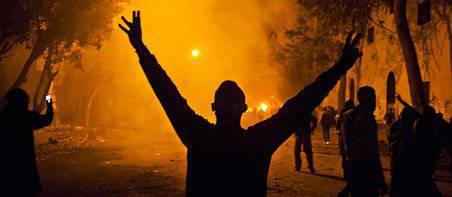 The wave of social and political upheavals that swept over the countries of North Africa and the Middle East in 2011 was unexpected only at first glance. In fact, it has become a reflection of the discontent that has accumulated in the Arab world due to a number of unresolved socio-economic and political-demographic problems. Beginning in Tunisia after the self-immolation of the small merchant Mohammed Bouazizi from the provincial city of Sidi Bouzid, the “Arab spring” spread according to the principle of a domino effect, acquiring an increasing mass character. And in the end it affected almost all countries of the Arab East.
The wave of social and political upheavals that swept over the countries of North Africa and the Middle East in 2011 was unexpected only at first glance. In fact, it has become a reflection of the discontent that has accumulated in the Arab world due to a number of unresolved socio-economic and political-demographic problems. Beginning in Tunisia after the self-immolation of the small merchant Mohammed Bouazizi from the provincial city of Sidi Bouzid, the “Arab spring” spread according to the principle of a domino effect, acquiring an increasing mass character. And in the end it affected almost all countries of the Arab East.In general, such revolutionary waves are a very rare phenomenon, which occurred only a few times in the world. stories. Hence the increased interest in the premises that led to this development. Since the majority of Arab states belong to developing countries with a moderate or underdeveloped economy, the view has taken root that the main causes of the socio-political destabilization wave are poverty, poverty, corruption, inequality, economic stagnation, etc. But this is not quite true .
Revolution fed
On the eve of the "Arab Spring" in the Arab world there was no economic stagnation. Arab economies developed very dynamically (especially in comparison with Western countries). The economy of Egypt over the thirty years of the rule of Hosni Mubarak has grown 4,5 times. Even in Yemen, GDP grew at a fairly rapid pace (although it was largely “eaten up” by extremely high population growth rates no longer characteristic of the rest of the Arab countries).
It is impossible to consider the main cause of the social explosion and the poverty factor. The proportion of the population living in extreme poverty (less than 1,25 dollars per person per day) is extremely small in most Arab countries and is quite comparable with the corresponding share in such frankly prosperous countries as Estonia or Slovenia. Even in the poorest state in the region — Yemen — the level of extreme poverty on the eve of the Arab Spring was comparable to that in the PRC and was almost three times lower than in India; besides, he had a steady downward trend. Real poverty, which is still characteristic of most third world countries, was not typical of these states. The situation with more moderate poverty (the share of the population living on less than 2 dollars per day) in the countries of the Arab Spring was more complicated, but here, against the background of the rest of the third world, these countries looked quite well.
There was no hunger there. According to food consumption standards, almost all Arab countries (again, with the exception of Yemen) have long since reached the level of overeating. The situation is similar with the level of social and economic inequality - by the standards of the third world is very moderate.
The high level of corruption cannot be blamed on the Arab Spring. The first victims of the "spring" were Tunisia and Egypt - countries where the level of corruption is not the highest (according to Transparency International, Tunisia was even slightly less corrupt than Italy on the eve of the revolution).
Youth mounds
At the same time, some economic factors played a role in generating a socio-political explosion in the Arab world. First of all, we are talking about the second wave of agflation. The first wave of global food price increases, in 2007 – 2008, led to a marked increase in socio-political tensions in some countries of the Middle East, and in some of them even provoked the appearance of cracks in the socio-political system. These spalling cracks contributed to the collapse of systems during a new wave of shocks at the start of 2011.
An important role in the destabilization was played by unemployment. However, it was due not so much to economic as structural, demographic and cultural factors. The unemployment rate in the Arab countries was not so high, moreover, it tended to decrease. For example, such a trend was in Egypt after the cabinet led by Ahmed Nazif arrived in 2004, and as a result, on the eve of the revolution, the unemployment rate in Egypt was slightly lower than, say, in the United States or the European Union. However, the rapid decline in mortality, including infant mortality (for example, in Egypt, from 1970 to 1990, total mortality fell by half, infant mortality by three, and infant mortality by four times), together with a belated decline in fertility. a sharp increase in the proportion of young people in the total population, including adults, that is, the so-called youth mounds (an unusually high proportion of young people in the general adult population) destabilizing political systems.
Well-known American sociologist Jack Goldstone notes: “Large cohorts of youth often attract new ideas or heterodox religions that challenge old forms of power. Moreover, since most young people have fewer obligations in terms of family and career, they are relatively easy to mobilize to participate in social or political conflicts. Youth played a crucial role in political violence throughout written history, and the presence of a “youth knoll” historically correlated with times of political crises. Most major revolutions ... including most twentieth-century revolutions in developing countries — occurred where particularly significant “youth bumps” were observed. ”
One of the most striking manifestations of these “youth bumps” was the fact that a fairly moderate overall unemployment rate in Arab countries on the eve of the “Arab spring” was combined with a catastrophically high level of youth unemployment. In Egypt, as we recall, the overall unemployment rate was lower than in the USA or in the EU countries, however, almost half of the unemployed were people aged 20 – 24 years. Moreover, shortly before this, there was an explosive growth in the enrollment of young people in higher education, so more than half of Egyptian unemployed graduated from universities, and hundreds of thousands of other graduates were forced to work as taxi drivers, waiters, vendors, etc. And at the same time they were concentrated in close proximity to the central government - in Cairo - and got the opportunity for self-organization through the Internet.
The initial coordination of the protests was carried out precisely through social networks. In Egypt, the call to take to the streets of 25 on January 2011 of the year originally came from the numerous Facebook group “We are all Khaled Said” and was directed against police brutality and for the abolition of the state of emergency. It should be noted that the parliamentary elections that took place in November-December of 2010 played an extremely important role in generating a social explosion in Egypt, during which the scale of falsification reached transcendental heights even for pre-revolutionary Egypt. The leading Egyptian opposition force, the Muslim Brotherhood, was practically unable to bring its representatives to the parliament of the new convocation (unlike the previous parliament, where several dozens of its members could go), which turned the Muslim Brotherhood from a half-system opposition into a frankly non-systemic and practically pushed them to Tahrir (is it worth mentioning that the wide scale of electoral fraud also contributed to the warming up of revolutionary sentiment among liberal youth).
Not shared
The success of anti-government demonstrations in Tunisia, Egypt and Libya, as well as the resignation of Ali Abdullah Saleh in Yemen, would hardly have been possible without a clear conflict within the ruling elites. Moreover, in each of the countries this conflict had its own specifics.
Thus, in Tunisia, there was an opposition between the army and the special services, on which the now former President Ben Ali relied. The number of local special services during his reign was almost four times as large as the army, which violated the balance of power traditional for the Arab world and alienated the army from ruling the country. After the coup and the flight of Ben Ali, the army set about restoring the balance, as evidenced by the mass arrests of the employees of the Tunisian special services.
In the case of Egypt, the conflict was between the army elite and the grouping of the son of President Gamal Mubarak (which included many prominent Egyptian businessmen). The military elite who held power in the country since the days of the July 1952 revolution of the year, jealously treated the potential possibility of Gamal Mubarak not connected with the army to take the post of president, who until that time was the prerogative of the military only. In addition, the top was not pleased with the prospect of a possible transfer of the property at the disposal of the generals under the control of businessmen from the Gamal group.
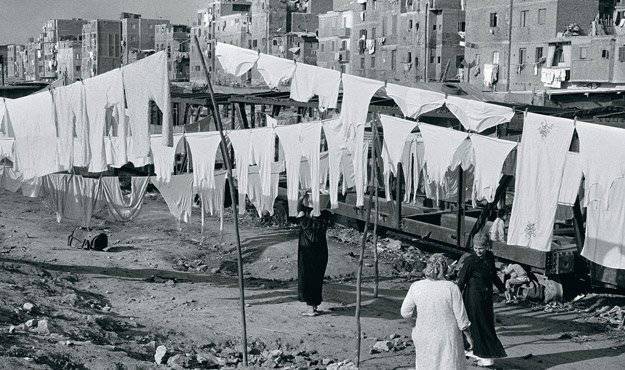
In Libya, the conflict between the tribes of Tripolitania and Cyrenaica made itself felt. Moammar Gaddafi, who came from Tripolitania, has been in power for more than forty years, and this caused discontent of the Cyrenaica tribes, deprived of the possibility of political participation, especially considering the fact of the location of the main oil fields of Libya in its eastern part.
Meanwhile, Syria and Bahrain managed to avoid intra-elite conflict, so that their political regimes have not yet fallen under the onslaught of "spring." Throughout 2011, the ruling Syrian regime showed a high degree of consolidation, and had the support of the internal Syrian system opposition, the army, and the diplomatic corps. The presence of the Alawites in power was not questioned, there were no cases of large-scale desertion of the military. Moreover, the armed forces and law enforcement agencies throughout the entire 2011 year remained the guarantor of the stability of the Bashar al-Assad regime. In addition, representatives of the Syrian diplomatic missions abroad demonstrated their commitment to the official mainstream. With reference to Bahrain, where all power is concentrated in the hands of the ruling house of Al-Khalifa, there is no need to talk about any conflict within the highest echelon of the political elite.
Pessimistic results
The “Arab Spring” to one degree or another led to the transformation of the societies affected by it. And above all, we are talking about the Islamization of social and political life. The Islamists have already become part of the political elite of Tunisia and Egypt and, no doubt, will take their toll in Libya. The only question is which of the ways these countries will go.
The most preferable is a scenario implying a balance of power between Islamists and the army. However, this requires the achievement of a political consensus between Islamists, starving for power, and generals, who traditionally hold power in their hands. Attempts to usurp the full power with relative parity of forces can lead to new socio-political upheavals and only make it difficult for the modernization processes in Arab countries, which have already slowed down in many ways with the advent of the “Arab spring”. The Egyptian and Tunisian economies have still not reached the pre-revolutionary growth rates and, most likely, are unlikely to come out in the coming years.
According to a very risky scenario, the situation in Libya is now developing. If during the forty-year reign of Muammar Gaddafi there was observed the de-traditionalization of Libyan society, which consisted in an attempt to overcome the tribal structure existing in the country, now there is an inverse dynamic. Traditional tribal structures are at risk to take over the modernization trends, and at the moment the main task of the Libyan National Transitional Council is to preserve the territorial integrity of the country.
On the other hand, in the course of the “Arab spring” in a number of countries real progress was achieved in restricting police brutality. In many of them, for the first time in the last decades (if not in all of their history), fairly fair elections were held (however, as a rule, their results were not very happy for revolutionaries). There is also reason to believe that the Islamists coming to power in Tunisia and Egypt will help to solve the problem of corruption in these states.
First, during the “Arab spring” in both countries, the most corrupt elements — the Trabelsi clan in Tunisia and the Gamal Mubarak grouping in Egypt — were removed from power. Secondly, the Muslim Brotherhood, like the An-Nahda in Tunisia, was able to prevent any serious corruption within their own movements, which means there is reason to believe that at the state level during their reign the corruption component decrease slightly. The Gaza Strip can be seen as a precedent, where the rise to power of Hamas led to a marked decrease in the level of corruption.
However, despite some positive features, it is still necessary to note that the “Arab spring” rather aggravated the socio-economic situation in the region, rather than solved the problems on the agenda of the Arab states. If on the eve of the socio-political upheavals, the Arab economies demonstrated steady economic growth rates, then with the onset of the “spring” the economic boom came to an end. Economic stagnation after a year and a half of unrest from the category of the fictional turned into real. Foreign investment has declined significantly, the tourism industry — one of the drivers of many Arab economies — continues to suffer huge losses.
Not solved the "Arab Spring" and the problem of unemployment. On the contrary, the situation in this area has only worsened and will become the main headache for the new leaders of the Arab states in the coming years. It is they who will have to solve the problems of the same educated, unemployed youth, who, as practice has shown, are not going to put up with the current state of affairs.
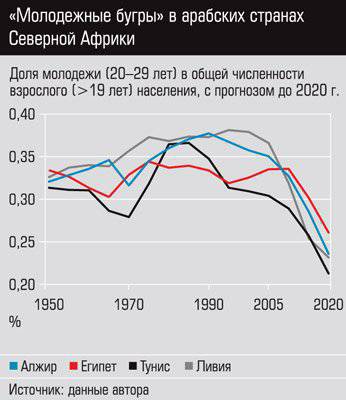
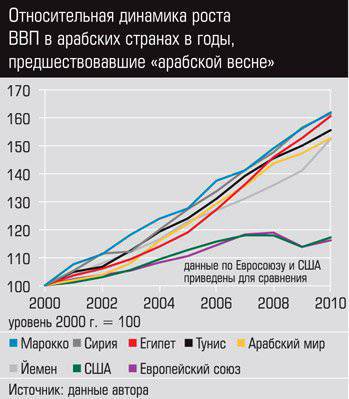
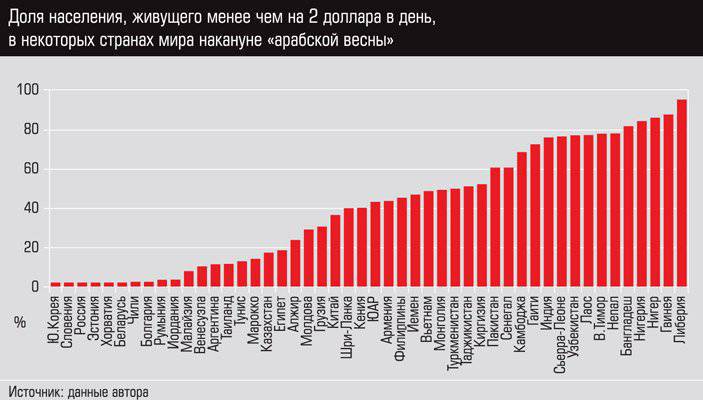
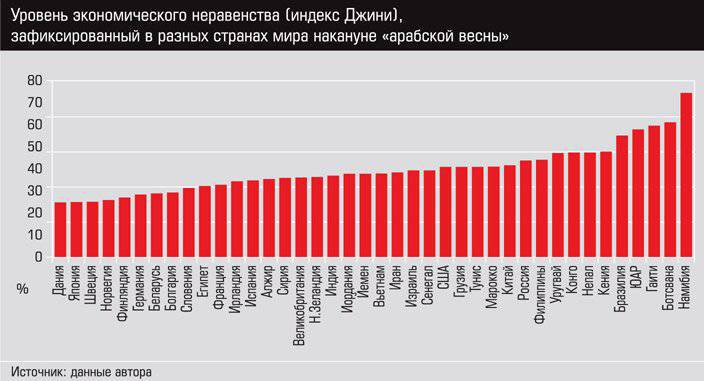
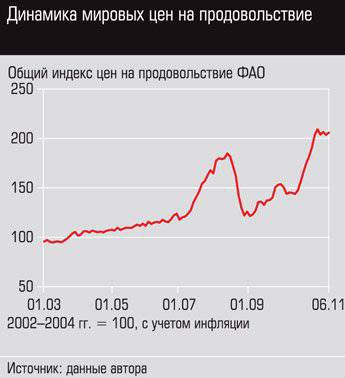
Information